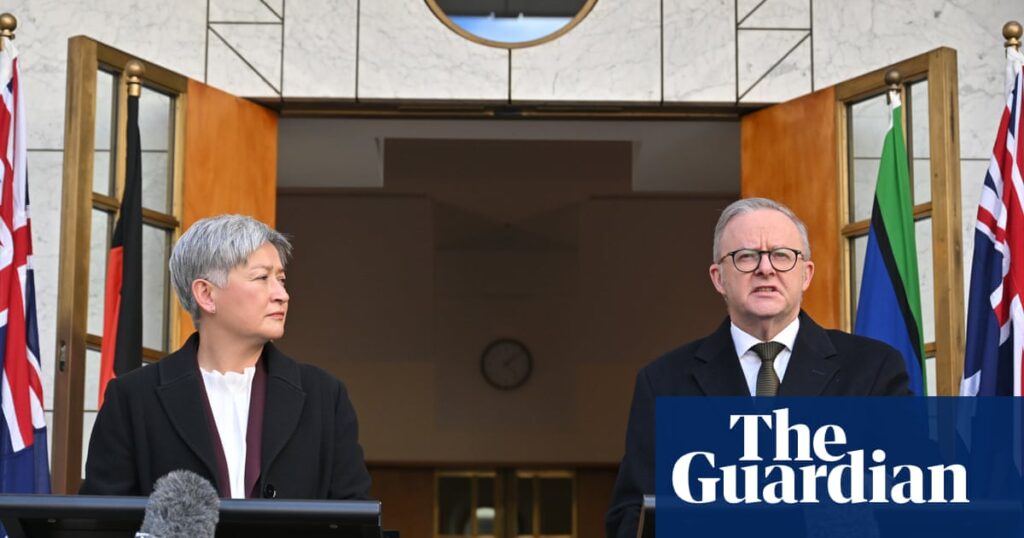The Australian government will recognise a Palestinian state at the United Nations general assembly next month, Anthony Albanese has confirmed, saying a two-state solution was “humanity’s best hope to break the cycle of violence in the Middle East and to bring an end to the conflict, suffering and starvation in Gaza.”
The confirmation comes hours after the Israeli prime minister, Benjamin Netanyahu – facing growing disapproval over the humanitarian crisis in Gaza – branded Australia and European nations “shameful” for considering recognising a Palestinian state.
The Australian prime minister said he spoke to Netanyahu last week and told him “the situation in Gaza has gone beyond the world’s worst fears”, citing an unacceptable civilian death toll.
More than 60,000 civilians have been killed during Israel’s bombing campaign in Gaza, local health authorities report, following the 7 October 2023 terror attack by Hamas where 1,200 Israelis were killed and dozens taken hostage.
“Australia will recognise the right of the Palestinian people to a state of their own, predicated on the commitments Australia has received from the Palestinian Authority. We will work with the international community to make this right a reality,” Albanese announced on Monday.
Appearing alongside Albanese, foreign minister Penny Wong said: “We can’t keep waiting for the end of a peace process that has ground to a halt.”
“We have always said that Palestinian civilians cannot be made to pay the price of defeating Hamas. But a whole population has been shattered. So this September, the international community has the chance to forge hope from despair, as the world seizes the opportunities that are presented by the new commitments of the Palestinian Authority and as the world seeks to support the Arab League’s efforts to isolate Hamas.”
The Executive Council of Australian Jewry (ECAJ) called the government’s decision a “betrayal” and a “disappointment”. Coalition defence spokesperson Angus Taylor called the decision “premature,” claiming it would reward Hamas.
Australia’s move matches recognition pledges made by countries including France, Canada and the United Kingdom in recent weeks, amid gathering international momentum for a Palestinian state and condemnation of Israel’s military campaign in Gaza, including plans to militarily occupy the entire territory.
The Labor government has been facing demands from inside and outside its party ranks to accelerate moves to recognise a Palestinian state, with public pressure growing after hundreds of thousands of people marched across the Sydney Harbour Bridge last weekend.
Sign up: AU Breaking News email
Calls grew at the weekend after Netanyahu’s cabinet announced plans to occupy Gaza – Wong urged Israel not to follow through on, claiming it could constitute a breach of international law.
Labor Friends of Palestine, an internal rank-and-file membership group which has been campaigning intensely for the government to recognise a Palestinian state, said Monday’s announcement “delivers on policy long supported by Labor members who will strongly welcome this move.”
Albanese spoke with Netanyahu last week to inform him of Australia’s pending move, while Wong spoke with US counterpart Marco Rubio on Monday.
The prime minister said Israel’s government “continues to defy international law and deny sufficient aid, food and water to desperate people, including children.”
In a written statement, Albanese and Wong claimed Netanyahu’s government was “extinguishing the prospect of a two-state solution” with its actions in threatening to further occupy Gaza and expand West Bank settlements.
“Australia is further compelled by the Netanyahu government’s disregard of the international community’s calls, and its failure to comply with its legal and ethical obligations in Gaza,” they wrote.
Albanese told the press conference Australia’s recognition pledge was predicated on commitments he said he’d received from the Palestinian Authority, the governing body which administers part of the Palestinian territory of the West Bank. Albanese said those commitments include a demilitarised Palestine, recognising Israel’s right to exist in peace and security, the PA holding elections and undertaking governance reforms, and no role for terror group Hamas in a future Palestinian state. He also said the government wanted Israeli hostages released.
after newsletter promotion
Wong on Monday said practical steps, such as an Australian embassy presence or conferring full embassy status to the Palestinian delegation to Australia, would be tied to commitments from the Palestinian Authority. She conceded there was “much more work to do in building a Palestinian state.”
“We will help build the capacity of the Palestinian Authority, and with the international community, Australia will hold the Palestinian Authority to its commitments,” Wong said.
Asked whether the recognition move was purely symbolic, Albanese said an end to conflict between Israel and Palestine could only come following a two-state solution, calling the move “practical contribution towards building momentum”.
In a statement, ECAJ president Daniel Aghion said the government had not confirmed what it would do if Israeli hostages were not returned, and that Israel “will feel wronged and abandoned by a longstanding ally.”
“This commitment removes any incentive or diplomatic pressure for the Palestinians to do the things that have always stood in the way of ending the conflict,” he said.
Netanyahu, in a press conference overnight, was strongly critical of growing international moves to recognise a Palestinian state.
“To have European countries and Australia march into that rabbit hole, just like that, fall right into it,” he said. “This canard is disappointing, and I think it’s actually shameful. But it’s not going to change our position.”
Netanyahu went on to claim Israel was “actually applying force judiciously, and they know it”.
“They know what they would do if right next to Melbourne or right next to Sydney you had this horrific attacks. I think you would do it, at least what we’re doing, probably maybe not as efficiently and as precisely as we’re doing it.”


